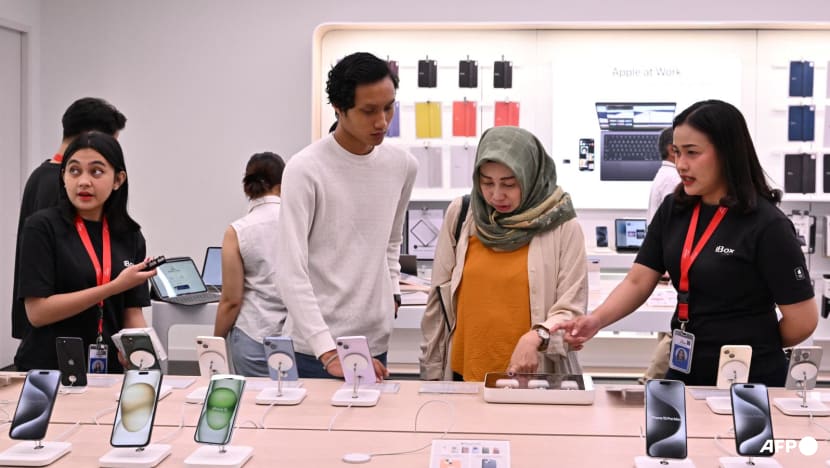Protectionist moves like iPhone 16 ban could help Indonesia gain investments, but risk backfiring: Analysts
Indonesia blocked the sale of Apple’s iPhone 16 and Google’s Pixel smartphones over rules on the use of locally made components. The country needs to be careful in flexing its bargaining power to gain foreign investments, observers say.

Indonesia officially banned the iPhone 16’s sale in the country on Oct 25, 2024, because Apple had not met the country's rules on the use of locally made components. (File photo: AFP/Adek Berry)

This audio is generated by an AI tool.
SINGAPORE/JAKARTA: After Indonesia banned the sale of Apple’s new iPhone 16 last month, 34-year-old Christine managed to get her hands on the gadget during a trip to Singapore.
The ban, she says, has only given rise to the “forbidden fruit effect”.
“I’ve had many people come up to me and ask, ‘where did you buy your phone?’ and ‘how much did it cost you to bring it here?’ Instead of being able to buy the phone (in Indonesia) and benefit Indonesian retailers, people are spending their money overseas,” said Christine, a housewife who declined to provide her full name.
“I think the ban is misguided,” she added.
On Oct 25, Indonesia officially banned the iPhone 16’s sale in the country because Apple had not met the country's rules on use of locally made components. Indonesia requires certain smartphones sold domestically to contain at least 40 per cent of parts manufactured locally.
A week later on Nov 1, the country banned the sale of Google Pixel phones for the same reason.
Last year, Indonesia blocked the marketplace feature on the popular social media app TikTok, arguing that it was hurting the country’s retail sector with cheap Chinese-made goods.
The move prompted TikTok’s Chinese parent company, ByteDance, to invest US$1.5 billion in a merger with Indonesian e-commerce giant Tokopedia this year, gaining re-entry into the market.
On Oct 1, Indonesia similarly banned Chinese e-commerce giant Temu, saying the platform could harm the country’s micro, small and medium enterprises (MSMEs).

Indonesia is also mulling a tariff of 100 to 200 per cent on imported goods from China, particularly textiles, clothing, footwear and cosmetics.
Its series of protectionist moves has led observers to caution that while the country could gain investments when companies bend to its rules, its strategy could also backfire.
Mr Bhima Yudhistira, director of Jakarta-based think-tank Centre for Economics and Law Studies, said Indonesia is flexing its bargaining power with the ban on the sale of both phones, to get Apple and Google’s Alphabet to immediately build factories in the world’s fourth most populous nation.
The Indonesian government’s measure amounts to “pseudo protectionism” and is its strategy to increase foreign direct investment in the tech industry, he said.
Unlike its ban on Temu and TikTok Shop, the phones’ sale bans are not meant to protect the domestic market, as Indonesia still relies on imports for tech products, he told CNA.
TOP-SELLING PHONE BRANDS OPPO, SAMSUNG HAVE FACTORIES IN INDONESIA
Indonesia introduced regulations in 2017 mandating that companies meet certain investment requirements if they want to tap the country’s 270 million-strong market, and its two best-selling phone brands have established manufacturing operations in the country.
South Korean electronics giant Samsung has invested more than US$1.8 billion in Indonesia, including building a factory in the outskirts of Jakarta to assemble its smartphones in 2015, two years before the regulation was enacted.
Meanwhile, Chinese electronic company Oppo invested US$82 million to build a factory west of Jakarta in 2022 to build phones for the Indonesian market.
Oppo is the best selling smartphone brand in Indonesia with a market share of around 18 per cent, followed by Samsung at 17.4 per cent. Apple’s iPhone ranked fifth with a market share of 11.5 per cent while the Pixel is far behind with less than 1 per cent.
In the wake of the ban, Apple has proposed an investment of almost US$10 million to make accessories and components for its gadgets in Indonesia, business news outlet Bloomberg reported on Nov 5, quoting an anonymous source.
Apple has not responded to the report. Mr Faisol Reza, a deputy industry minister, told CNBC Indonesia on Wednesday (Nov 6) that it is in talks with Apple, but did not elaborate.
POTENTIAL TO BACKFIRE
Apple’s investment pledge could be seen as a win for Indonesia.
The creation of jobs is important to Indonesia’s economic and political stability, noted Maybank analyst Etta Rusdiana Putra.
“The (Indonesian) government also wants to reduce imports to improve its trade balance, help its currency, and maintain Indonesian purchasing power.”
But heavy-handed moves could backfire and deter other companies from entering or scaling up their presence in the country, undermining newly-minted president Prabowo Subianto’s efforts to attract foreign investment, analysts say.
On the potential tariff on Chinese goods, Dr Siwage Dharma Negara, a senior fellow at Singapore’s ISEAS-Yusof Ishak Institute, said: “China is Indonesia’s most important trading partner... The country is also dependent on China’s investment in the downstream industry. So, (Indonesia) will be careful in implementing unilateral trade restrictions that can potentially worsen the economic relations or trigger retaliations.”
Mr Prabowo is seen as following the playbook of his predecessor Joko “Jokowi” Widodo, who is considered instrumental in the former’s ascent to presidency.
Mr Prabowo, who has promised to continue many of Jokowi’s programmes and policies, has reappointed several members of Jokowi’s cabinet. They include Mr Agus Gumiwang Kartasasmita, who reprised his role as industry minister, and Mr Zulkifli Hasan, a former trade minister who is now the coordinating minister for food affairs.
Mr Gumiwang is behind the iPhone 16 and Google Pixel sale bans, while it was Mr Zulkifli who first stated Indonesia is mulling tariffs on Chinese-made goods.
“Given many of the economic team members in (Prabowo’s) cabinet are old faces, I don't think there are any substantial differences in (Prabowo’s and Jokowi’s) approaches,” said Dr Muhammad Faisal, director of Jakarta-based think-tank Centre of Reform on Economics (CORE).
But Jokowi’s protectionism approach has seen pushback from other countries.
In 2022, the World Trade Organization ruled in favour of the European Union in a dispute over Indonesia’s ban on nickel ore exports, which Jokowi introduced as Indonesia sought to become a major player in the production of batteries for electric vehicles. The EU argued the ban was hurting Europe’s stainless steel industry.
Indonesia is appealing the decision and has not lifted its export ban.
In 2017, the WTO also ruled in favour of the United States and New Zealand over Indonesia's restrictions on imports of food and animal products between 2013 and 2014, which aimed to deal with temporary surpluses in the domestic market.
Mr Bhima said Indonesia could face a similar case if it continues to go down the current protectionist path.

SOLVE LOCAL BUSINESSES’ UNDERLYING PROBLEMS, EXPERTS SAY
In recent years, Indonesia has seen a sharp decline in its middle-class population from the effects of the COVID-19 pandemic, which left many businesses and factories shuttered.
Mr Prabowo has promised to create 19 million jobs and the best way to do that, analysts say, is to attract more foreign investments to revive its languishing manufacturing sector.
But forcing companies to invest through the threat of tariffs and import bans is not the way to go, experts say.
After combining its TikTok Shop with Tokopedia, ByteDance reportedly began slashing about 450 jobs at its Indonesian e-commerce arm from June. The reduction makes up about 9 per cent of the arm’s employees, Bloomberg reported.
“To attract investment, policy consistency is crucial. Discriminatory treatment should also not be applied between foreign and domestic investors for whatever policy the government wants to impose,” said Mr Faisal of CORE.
Indonesia needs to upskill its workforce, remove red tape and reduce the cost of shipping goods across the vast archipelago by building infrastructure like ports and roads, he added.
It needs to address the underlying problems that prevent local products from competing with cheap imported goods and protect Indonesia’s MSMEs, which account for 61 per cent of the country’s gross domestic product and employ 97 per cent of the workforce.
“The problems (faced by) SME business actors in Indonesia is not only competition with imported goods but also high lending rates, a fairly high skills gap for SME employees, low quality control and uncompetitive logistics costs,” Mr Bhima of CELIOS said.
“Rather than carrying out baseless protectionism, the government should solve (these) fundamental problems.”
According to the Asian Development Bank, high technology costs and limited financial support have posed a problem for Indonesia’s small business operators.
In adapting to the realities of a global online marketplace where consumers can buy competitively-priced goods from abroad, Dr Siwage from ISEAS-Yusof Ishak Institute said there are opportunities for Indonesia.
Citing the success of local e-commerce platforms Tokopedia and Bukalapak that are now considered “unicorns” – start-ups valued at over US$1 billion – Dr Siwage said the country could create a better environment for more local start-ups to flourish.
“(Indonesia) should design policies and incentives for foreign investors to collaborate with local investors,” he said, noting that Tokopedia’s merger with TikTok Shop could be a business model for other companies.
SOME CONSUMERS BURNT BY iPHONE 16 FRAUDSTERS
The ban on iPhone 16 and Google Pixel phones have so far spurred many to seek the products in the black market or overseas, potentially costing Indonesia millions of dollars in sales tax.
Indonesian industry ministry spokesman Febri Hendri said that as of last month, 9,000 iPhone 16 units have entered Indonesia.
The units were bought overseas and are now being privately used. Mr Febri said his office will make sure that the phones will not be resold and enter the Indonesian market.
The cheapest iPhone 16 is priced at about S$1,299 (US$994) in Singapore, according to Apple. Buyers from Indonesia will have to pay an additional US$155 in import duties if they want to bring the iPhone into their country.
Shortly after the ban on Oct 25, Indonesian e-commerce websites were flooded with people claiming to be selling the new phone.
Mr Febri said the ministry has asked these marketplaces to take down these offers, and many have complied.
“We ask people not to be tempted to buy iPhone 16 from marketplaces and unofficial offline stores. We will take action on any information regarding the selling and buying of iPhone 16,” Mr Febri said in a statement on Nov 1.

Some consumers have nonetheless fallen prey to dishonest sellers.
University student Oriza placed her iPhone 16 order with a seller who “claimed that the phone was bought overseas and had been modified in such a way it can circumvent Indonesia’s ban on the product”.
Full of anticipation when a delivery man came knocking on her door late last month, the 21-year-old Jakarta resident was soon let down.
“When I opened the box, it was actually an iPhone 13,” said Ms Oriza, who declined to provide her full name.
She has since tried to contact the seller for a refund and has also contacted the online marketplace for the seller to be blacklisted, but her attempts have yet to bear fruit.





















